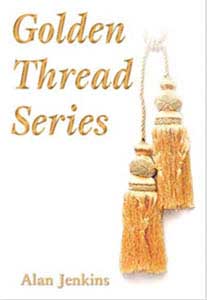
518 pages, Paperback. Published by Grosvenor House Publishing Ltd, Link House, 140 The Broadway, Tolworth, Surrey, KT6 7HT. ISBN-13:978-1-839750-55-7.
This book is evidence of a great deal of time spent by the writer in studying the scriptures. It is,in essence,a series of character studies under four general headings:the Patriarchs, the Pioneers, the Prophets and the Preachers. The overriding theme which unites the individuals considered in this book is their willingness to listen to the voice of God,and to follow the guidance and instruction given, in order to live lives which the Spirit of God has left on record for our learning.The opened ear and the responsive heart of those considered, provide the golden thread which runs through the book as through the scriptures from Genesis (Noah) to Revelation (John).
Choice is made from the available subjects to develop certain themes which provide practical lessons for the people of God in every age. The first of the Patriarchs considered is Noah, the man who listened. His story is developed around the eight occasions when God spoke directly to him in Genesis chapters 6 to 9. This is followed by Abraham, the man who obeyed, Isaac, who submitted, Jacob, who learned,and Joseph, the man who waited. Their life stories are each told, mainly through a series of chapters with alliterative headings, which brings out the main features of the subject’s life.
This structure continues throughout the chapters which follow, always maintaining the fundamental precept of willingness to obey the voice of the Lord. The blessings which resulted bear out the importance for every believer to hear and attend to the words communicated by the Spirit of God through the scriptures.
As in all character studies, different readers may take an alternative view of certain events and actions, but, overall,this book maintains a consistent line in bringing out the best of those under consideration.
The first section of the book is not well served by the copious and unnecessary use of uppercase words in the narrative. These disappear from part two onwards to the overall benefit of the book.
| Cookie | Duration | Description |
|---|---|---|
| cookielawinfo-checkbox-advertisement | 1 year | Set by the GDPR Cookie Consent plugin, this cookie is used to record the user consent for the cookies in the "Advertisement" category . |
| cookielawinfo-checkbox-analytics | 11 months | This cookie is set by GDPR Cookie Consent plugin. The cookie is used to store the user consent for the cookies in the category "Analytics". |
| cookielawinfo-checkbox-functional | 11 months | The cookie is set by GDPR cookie consent to record the user consent for the cookies in the category "Functional". |
| cookielawinfo-checkbox-necessary | 11 months | This cookie is set by GDPR Cookie Consent plugin. The cookies is used to store the user consent for the cookies in the category "Necessary". |
| cookielawinfo-checkbox-others | 11 months | This cookie is set by GDPR Cookie Consent plugin. The cookie is used to store the user consent for the cookies in the category "Other. |
| cookielawinfo-checkbox-performance | 11 months | This cookie is set by GDPR Cookie Consent plugin. The cookie is used to store the user consent for the cookies in the category "Performance". |
| elementor | never | This cookie is used by the website's WordPress theme. It allows the website owner to implement or change the website's content in real-time. |
| viewed_cookie_policy | 11 months | The cookie is set by the GDPR Cookie Consent plugin and is used to store whether or not user has consented to the use of cookies. It does not store any personal data. |